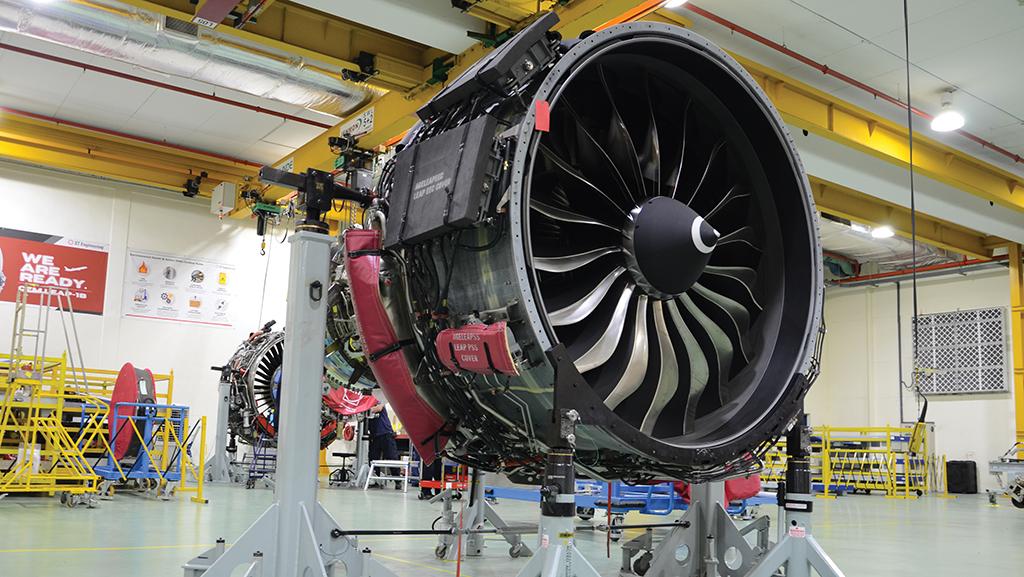
ST Engineering is one of several MRO providers that have recently added next-generation engine capabilities.
As engine overhaul and performance restoration work gradually picks up pace in 2023, MRO providers are seeing a steady flow of shop visits. Many of these are related to current-generation engine types, with CFM International’s CFM56 and International Aero Engines’ V2500 accounting for most of the engine maintenance activity in the narrowbody segment, according to Aviation Week’s Fleet & MRO Forecast data. In the widebody engine segment, Rolls-Royce’s Trent 700 series, GE Aerospace’s CF6-80, CF34 and GE90 and Pratt & Whitney’s PW4000 are anticipated to generate most of the engine shop visit activity over the next few years.
In the near and midterm, much of the capability ramp-ups have centered on narrowbody engine types. A good deal of this activity in the next few years likely will revolve around CFM International’s Leap program and Pratt & Whitney’s geared turbofan (GTF) family. The first wave of Leap and GTF engines making their first shop visits is expected to hit in 2025. Aviation Week data projects that the Leap 1A, which powers the Airbus A320neo and entered service in 2016, will have 80 engine overhauls in 2025, nearly double the 48 forecast for 2024. Leap 1A overhauls are expected to hit three figures starting in 2026 and continue to ascend. The Leap 1B is not anticipated to see any sizable overhaul activity until 2029. Pratt’s PW1100G variant, a A320neo option, probably will experience more immediate levels of overhaul activity than the Leap. Aviation Week data projects that more than 100 PW1100G overhauls will take place in 2024, an increase from the 64 expected this year.
After the segment’s slump in 2020-21, growing demand levels are welcome to MRO providers, but the caveat is the need to ensure the supply of maintenance services. This issue is proving challenging, with concerns around capacity readiness for the upsurge in work and labor shortages following global industry downsizing due to the COVID-19 pandemic over the past three years. In addition, ongoing production issues at engine OEMs have created shortages related to components while the pipeline of used serviceable material has been constrained on certain aircraft and engine types.
Engine manufacturers have looked to remedy these issues by adding much-needed capacity and capability to their networks.
CFM announced several additions to its Leap aftermarket network in the past year, with MRO providers in North America, Europe and the Asia-Pacific region ready to pick up the eventual increase in shop visits. These include Switzerland-based SR Technics, which signed a licensing agreement for the Leap 1B in February, having joined International Aero Engine’s global aftermarket network for the GTF engine last year. The MRO provider is one of several companies adding testing capability. SR Technics told Aviation Week that it plans to reactivate a former test cell in Zurich to prepare for current-generation CFM56-5B and -7B engines, the newer PW1100-JM and, eventually, for the Leap 1A and 1B.
Singapore-based ST Engineering also has ramped up its Leap capability. Tay Eng Guan, the MRO provider’s senior vice president and general manager, says the company plans to grow full maintenance capabilities, including testing for the Leap 1A and 1B. “We will have test capability for Leap 1B by the end of 2023 and will be able to carry out full performance restoration shop visits by the first quarter of 2025,” he says. “For the Leap 1A, we will have test capability by [the first quarter of] 2024 and full performance restoration shop visit capability by the end of 2024.”
In the U.S., StandardAero announced plans to start Leap services at its facility in San Antonio following the signing of a branded service agreement to join CFM International’s aftermarket network for Leap 1A and 1B engine services in February 2023. “Following 12 months of that going into 2025, we plan to move into full performance restoration work on the Leap,” Lewis Prebble, president of airlines and fleets at StandardAero, tells Inside MRO. “The plan is to start services on the 1A and 1B very close together—likely within about two months of each other. We’ll determine which one we are going to prioritize, but as it stands, the Leap 1B services will likely start first.”
Large players Lufthansa Technik (LHT) and AFI KLM E&M also have rounded out their Leap and GTF capabilities. The German MRO giant, which initially partnered on the Leap program in 2018, signed a Leap 1B branded service agreement last year, while its Franco-Dutch competitor signed a similar agreement for both 1A and 1B engines. LHT penned an agreement with Safran Nacelles to join the licensed repair network for nacelles on Airbus A320neo’s Leap 1A engine in April as well. The agreement enables LHT to carry out warranty tasks, repairs and modifications on behalf of Safran Nacelles, the specialist repair division of the French OEM.
Meanwhile, MTU Maintenance bolstered its GTF capability last year by adding approval for the PW1500G and PW1900G, which power the Airbus A220 and Embraer E-Jet, respectively. Iberia Maintenance also will start servicing PW1100G engines this year, following its addition of GTF test cell capabilities in Madrid.
Initially, work related to the Leap and GTF mostly will be quick-turn and hospital shop visits, a repair service that saw a considerable upsurge in demand during the pandemic and led some MRO providers to introduce specific capabilities for these lighter engine services. Among these companies was Singapore-based SIA Engineering Co., which established a specialist quick-turn engine facility for the Leap 1A and 1B last year, enabling it to perform 60 engine quick turns per year while gaining an estimated 50% capacity boost.
MROs smaller in scale also have looked to add specific engine capabilities such as borescope inspections to capitalize on growing demand for lighter, less intensive engine services favored by operators since the pandemic.
The previously suppressed widebody engine MRO segment has seen an unanticipated uptick over the past year. New-generation engines such as the GEnx and the Rolls-Royce Trent 1000 and XWB likely will generate consistent annual overhaul work in the next decade.
Rolls-Royce and GE Aerospace, which dominate the widebody engine market, have added several partners to their aftermarket networks while establishing joint ventures with new-generation engine focuses. Last year, Rolls announced the establishment of a China-based joint venture with Air China that will provide MRO support for the Trent 700 powering the Airbus A330, Trent XWB-84 powering the Airbus A350 and the Trent 1000 powering Boeing 787 aircraft.
